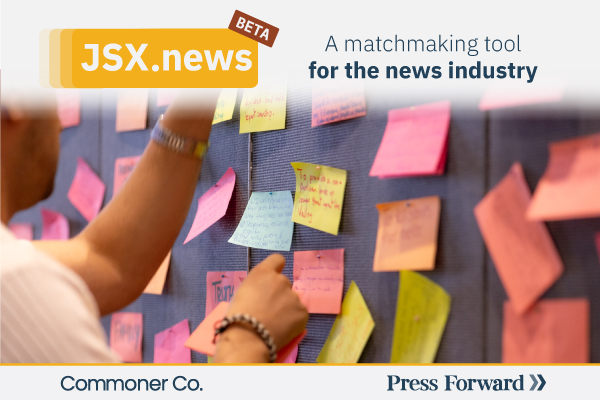If you’ve ever spent hours searching for business services, technical help, training resources or grants for your newsroom, or relied solely on suggestions from friends—only to wonder if you’re missing better options—you’re not alone. That’s the problem the Journalism Support Exchange (JSX) was built to solve.
News and information leaders face a paradox: The journalism support landscape has never been more robust, but it’s also confusing to navigate. Meanwhile, more small, lean local news businesses are turning to support organizations for critical guidance on modernizing their digital presence, generating revenue, and accessing or developing cost-saving shared services. But figuring out who does what, which organizations might fit your specific needs, and how to actually connect with them can feel like a full-time job on top of your actual full-time job.
We’ve seen this challenge from a few different angles. At Commoner Co., we’re a team of journalists, startup founders and local news advocates—we’ve built tools like Documenters.org and the LION Sustainability Audit to better connect people to resources and insights. At Press Forward, we’re helping funders—many who are new and place-based—navigate the field of journalism, which often involves helping newsrooms in their local ecosystems find and access best-in-class tools, training and shared services. And with a large percentage of support from Press Forward’s national funders flowing through JSOs, it becomes even more important to help connect these dots, and ensure local newsrooms can find and access resources that are timely, responsive and leveraged.
Over the course of 2025, the Commoner team interviewed leaders in the field on the strengths and challenges of journalism support organizations (JSOs)–like the ones we’ve worked with– and shared our findings in this report. As a growing number of voices from the field (here, here and here) have advocated for better coordination amongst JSOs, we recognized the first thing we need is more field-level transparency into who is doing what, and for whom.
Based on our own experiences—including Melissa’s development of a state-level database for Colorado, created with Impact Architects in 2023—and lots of additional feedback from newsroom leaders, support organization staff, and other funders, we scoped the JSX based on actual needs of the entire field—not just what sounds good in theory. And thanks to thought partnership with Press Forward and its grantees, plus technical expertise from Public Data Works, we’ve turned those ideas into a practical starting place for navigating our growing field.

Karen Rundlet, CEO and executive director of the Institute for Nonprofit News, at the 2025 Press Forward Summit.
What the JSX Does
Think of the Journalism Support Exchange as a matchmaking tool for the U.S. local news industry. It’s a searchable database of more than 300 organizations that support journalism with shared resources, programs, tools, services, training, peer learning, events and/or grants.
Every entry in the JSX has basic information about the support organization, including a short description, website link and a primary support type category that we’ve selected for them.
Leading up to the JSX launch, we invited all of the listed organizations to log into the JSX to edit their “information card” — a standardized entry that clearly explains what they offer, who they serve, and how to work with them. To date, nearly 100 organizations have filled out their information cards.
This means that when you search by the specific type of support you need—such as financial management, technology tools, strategic planning, and legal help—organizations offering that type of support will appear.
The support is out there. The JSX helps you find it and connect the dots, making the existing infrastructure visible and accessible in one place; and, most importantly, enables us, as a field, to target gaps.

Jesse Hardman of the Listening Post Collective at the 2025 Press Forward Summit.
Try It and Tell Us What You Think
The Journalism Support Exchange is now live in beta—but we’re not finished. The tool will only get better and more useful as more “information cards” are completed by journalism support organizations. We’ve already received lots of feedback and ideas for new features, which we’re looking forward to exploring in future updates. And please give us your feedback via a four-question survey pop-up on the tool.
A big thank you to our project launch partners, who were early adopters of the tool and gave us valuable feedback: American Journalism Project, City Bureau, Community News Lab, Global Center for Journalism and Trauma, Free Press, Impact Architects, Institute for Nonprofit News, Listening Post Collective, LION Publishers, Local News Impact Consortium, MuckRock, News Futures, OpenNews, Reporters Committee for Freedom of the Press and Trusting News.
If you’re a journalism support organization that hasn’t filled out your information card yet, you can login into the JSX with your organization’s email address and claim your profile to edit.
If you’re not yet listed in the JSX, you can visit the homepage and select “Add your organization.” Once submitted, all entries are vetted and approved by the JSX team.
If you’re a newsroom leader looking for support, explore the database, search for what your newsroom needs.
We invite all users to let our team know how the JSX helped you and how it could work better. Your input will shape what comes next for the JSX.
Visit jsx.news to get started.
The JSX platform uses industry-standard security practices, including encrypted data transfer and daily automatic backups, to protect user information.
Darryl Holliday and Anika Anand are founders and partners at Commoner Co. Melissa Milios Davis is network manager for Press Forward.


